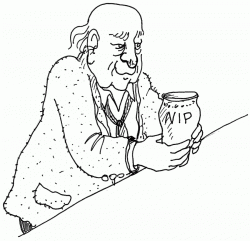Euphemisms: Know any synonyms for sober?
Q. In a world that gets drunk on euphemisms, what are a few of the favorites? –W.C. Fields
A. The thousands of synonyms for drinking and drunkenness range from the mundane ("tipsy") to the arcane ("all geezed up") and the colorful ("at peace with the floor,") says Ralph Keyes in his book Euphemania: Our Love Affair with Euphemisms. With elaborate decorum, drinkers "bend an elbow" to down a libation as an "eye-opener" to start the day or a "nightcap" to end it. In between, they might enjoy a "pick-me-up," a "nip," a "little snort," a "wee drop." At best, all of this may lead to having "a glow on," at worst, to being "smashed," "schnozzled," "under the table," "pie-eyed," or "stewed to the gills."
During Prohibition, some feared that the colorful drinking euphemisms might disappear, one newspaper even fretting that "Hereafter Only Prunes will be Stewed." But the period from 1920 to 1933 constituted a "Golden Age" of euphemistic alcohol talk. In one 1922 U.S. District Court case, when a lawyer asked a witness if he'd been "keyed up," he answered that he'd been "pretty well organized" and "about soused." Then the judge spoke up: "All these slang expressions will not be tolerated in the court. If the man is drunk, all right. I do not know the legal meanings of 'soused,' 'keyed up,' 'organized,' but I do know what 'drunk' means. A man is drunk who is not his normal self, under the influence of liquor."
The lawyer then asked his witness if he'd been drunk.
"Yes," was the reply. "Yes."
Q. Are you = to the question, "Where did the equal sign of mathematics come from?" –S. Hawking
A. Not from the land of the Greeks, Babylonians, or Arabs but from a small coastal town in South Wales, where 16th-century astronomer and mathematician Robert Recorde wrote textbooks that included the then-vertical equal sign, say John Lloyd and John Mitchinson in The Book of General Ignorance. His reason for adopting two parallel lines was refreshingly to the point: "bicause noe 2 thynges, can be moare equalle." It took a while for the sign to catch on, as it alternated with "ae" (from "aequalis") well into the 17th century.
One Recorde invention that never did catch on was his word describing numbers to the eighth power, for example, 2 x 2 x 2 x 2 x 2 x 2 x 2 x 2 = 256: "Zenzizenzizenzic," based on the German "zenzic" for "square," signifies "squared, squared and squared again." Whatever its lack of appeal, zenzizenzizenzic comfortably holds the record for most z's in a single word.
Q. The sounds of the English language are well known to most of us. But can you name a few striking sounds from the world's languages with a "foreign" ring to them? –S. Wences
A. Spanish Silbo, a whistle language, has only four vowel and four consonant sounds, says Dean Christopher in Discover magazine. "Audible for miles, it resembles bird calls and is indigenous to– where else?– the Canary Islands."
And when the Dutch encountered Africa's Nama people, whose language includes clicking sounds, they were dubbed Hottentots, or Dutch for "stuttering."
For those who recall the old Westerns in which Native Americans made a sound like "ugh," it was "a naïve attempt" to reproduce the sound of the glottal stop of many Native American languages, produced by briefly closing the vocal cords during speech. Indian Sign Language is the world's most widespread silent language, with some 2.7 million users.
And perhaps the ultimate sound of silence: More than a third of the world's 6,800 spoken languages are endangered. "According to UNESCO,” Christopher writes, “about 200 tongues now have fewer than 10 surviving speakers."
~
Send Strange questions to brothers Bill and Rich at
